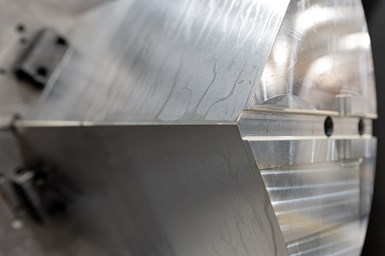Dillon Large-Diameter Full Grip Pie Jaws Designed for Strength, Reliability
Maximum contact area from the full grip jaws is said to provide a solid gripping surface, which yields more friction for drive with reduced part distortion.

Dillon’s extruded aluminum full grip pie jaws. Photo Credit: Dillon Manufacturing
Dillon Manufacturing’s full-grip pie jaws are made from 6061 extruded aluminum and available up to 28" in diameter. Machined from aluminum barstock, the company says these large-diameter full grip pie jaws are stronger and more reliable than cast aluminum, with none of the inherent porosity. These wraparound-type top jaws are said to distribute more of the gripping pressure across the workpiece to reduce part distortion.
Jaw heights of up to 10" are also available and the diameters can also be made larger than the chuck to increase the chuck’s capacity. Maximum contact area from the full grip jaws provides a solid gripping surface which yields more friction for drive with reduced part distortion, the company says. Custom designs are also available with special heights, diameters and configurations, including a matching serration location, which is exactly perpendicular to the slots.
These jaws are manufactured in the U.S. with lead times of typically two weeks or less. The company says the chuck jaws are well suited for high-speed machining, as well as precision boring, tapping, drilling and finishing across a variety of industrial markets. In addition to 6061 extruded aluminum, the jaws are also available in brass, 1018 steel and cast iron.
Standard and custom full-grip jaws are available in serrations of 1.5 mm × 60 degrees, 3.0 mm x 60 degrees, 1/16 × 90 degrees, or 3/32 × 90-degrees, American standard or tongue and groove, Acme and square serrated key-type mounting interfaces. The chuck jaw products are ISO 9000-2015 registered.
Related Content
-
When to Use a Diaphragm Chuck
The accuracy and repeatability of these chucks make them well suited for a number of workholding applications, including turning and grinding.
-
SMW Autoblok Workholding System Streamlines Changeovers
The TMS-2G system enables the operator to change the chuck in minutes accurately and securely, making it versatile for diverse metalworking requirements.
-
Precision Machining Technology Review: August 2025
Production Machining’s August 2025 technology showcase includes some of the latest technology from Big Daishowa, Greenleaf, The L.S. Starrett Co., Schwanog, Supertec and SMW Autoblok.












